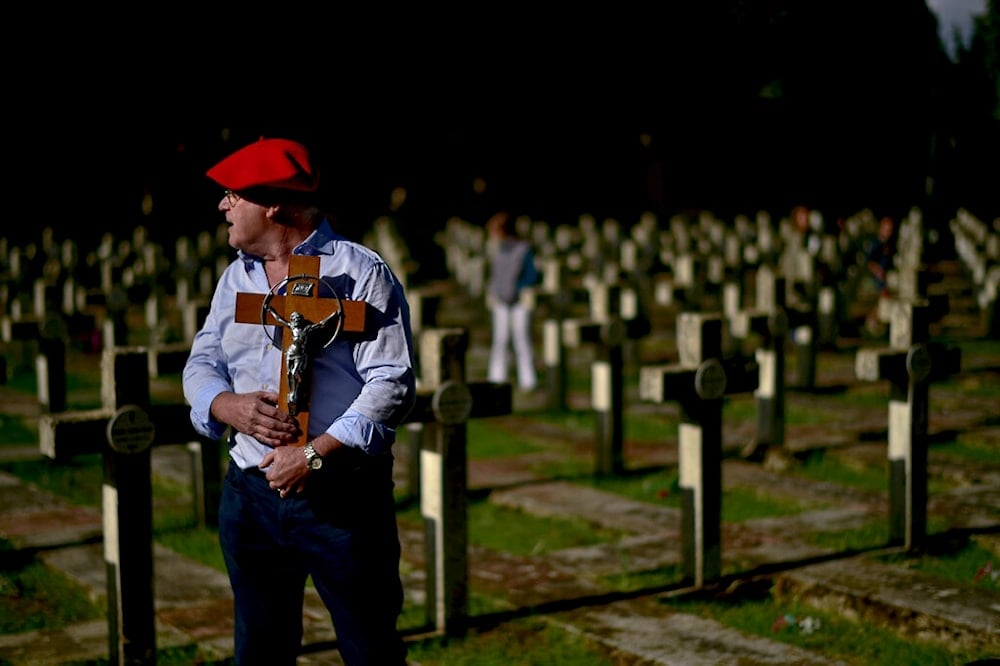Franco-era mass graves resurface as Spain confronts its past
As Spain marks 50 years since Franco’s death, exhumations of mass graves from the Spanish Civil War continue, seeking to identify 140,000 missing persons.
-

A person wearing the traditional red beret of the "Requetes", a rebel militia that fought against the republican government, holds a crucifix on a tribute in memory of the rebels dead during the Spanish civil war (1936-1939) during All Saints Day, a Catholic holiday to reflect on the saints and deceased relatives, at the state cemetery in Pamplona, northern Spain, Tuesday, November 1, 2022. (AP Photo/Alvaro Barrientos)
Nearly 50 years after the death of Francisco Franco, the legacy of Spain’s civil war continues to echo through mass graves scattered across the country. In Ejea de los Caballeros, a quiet town in northeastern Spain, AFP reports that exhumation work has begun at one such site where an estimated 150 victims were buried during the early days of the 1936–1939 Spanish Civil War.
The effort is personal for people like Maria Jesus Ezquerra, 88, whose father, Jesus Ezquerra, a Socialist councillor and labourer, was arrested shortly after the 1936 nationalist military coup and buried in a common grave just two days later. She was born shortly after his death.
"It's my only dream, after that, I can die," she told AFP, tearfully, from her home in the village of Pinsoro. “I have always loved my father very much, even without knowing him.”
Read more: Assange demands 20-year jail term for US-linked Spanish spy chief
Families seek closure through civil war exhumations
Maria Jesus is one of the last surviving children of victims, raising the possibility of identifying her father through DNA testing. Her story mirrors that of thousands of families still searching for their missing relatives nearly a century after the war began.
Franco’s Nationalists defeated the Republicans, leaving the country devastated and divided. While the regime commemorated its own dead, Republican victims were often buried in unmarked graves.
Spain's government estimates more than 3,300 mass graves exist across the country, with around 140,000 people still unaccounted for. The most prominent burial site is the Valley of the Fallen near Madrid, where 33,000 bodies from both sides of the conflict were interred, many without the consent of their families.
In 2019, Franco’s own remains were exhumed from the site and transferred to a more discreet family vault.
Read more: Indigenous voices heard as Spain regrets colonial-era abuses
Ejea de los Caballeros becomes site of remembrance
The excavation in Ejea de los Caballeros is being led by the Asociacion Memoria Historica Batallon Cinco Villas. “We expect the project to last around two years because it requires significant resources,” said the association’s secretary, Javier Sumelzo. “DNA testing will take time as well.”
Forensic archaeologist Javier Ruiz, who leads the dig, highlighted to AFP that the lack of a national genetic database is one of the main challenges. Currently, only fragmented regional databases exist, slowing identification efforts.
“The worst part is opening a grave and being unable to identify almost anyone. Time only makes it harder,” Ruiz told the news outlet. With most direct descendants now deceased, experts must rely on lateral genetic lines, which are more difficult to trace.
Limited DNA access slows recovery of missing persons
Despite a 2022 law that made the Spanish state responsible for exhumation efforts, much of the work remains in the hands of civic organizations. Cristina Sanchez, a forensic archaeologist on the Ejea team, stressed the importance of working with families to gather clues beyond DNA.
“Sometimes families send us photos, or tell us if someone had a limp, wore glasses, or had a particular feature,” she told AFP. “You can get clues, but DNA testing is essential. Otherwise, you risk giving people false hope.”
Over the past five years, only 70 of the 9,000 exhumed bodies, less than 1.0%, have been returned to families, according to government data.
Memory law shifts responsibility to Spanish state
The 2022 memory law under Spanish Prime Minister Pedro Sanchez aimed to institutionalize exhumation efforts and strengthen support for families. Still, logistical gaps and the slow pace of identification remain significant hurdles.
Conchita Garcia, daughter of Maria Jesus, said the process offers families long-overdue closure. “These exhumations do not reopen wounds; they close them,” she told AFP.
Ramon, Marivi, and Paquita, three cousins in their 60s, recently buried their grandfather, Eusebio Fenolle Miguel, who was identified after being exhumed from a nearby village. His remains were placed alongside his wife, covered in a wedding photo.
“It was a relief, because you have found someone you never knew, but whom you loved,” Ramon said to AFP while visiting the grave with his cousins.
Read more: Catalonian party withdraws support for Spanish government

 4 Min Read
4 Min Read










